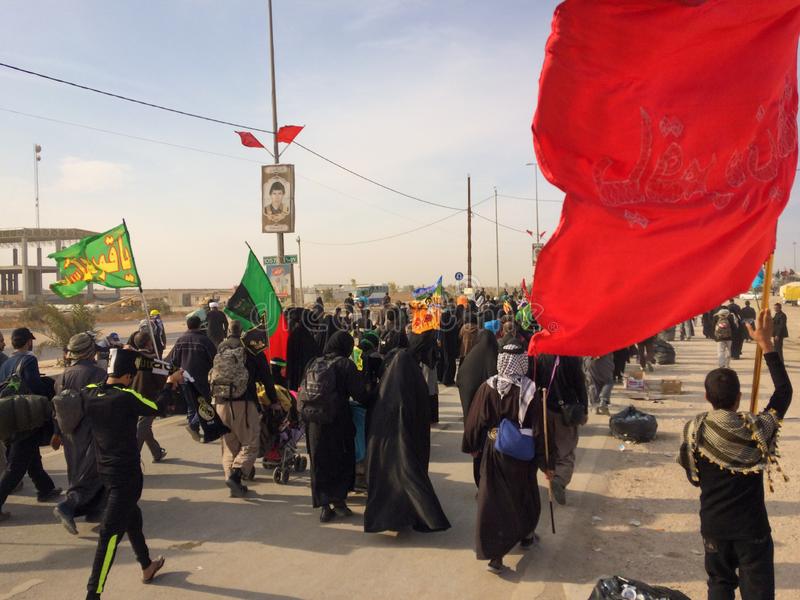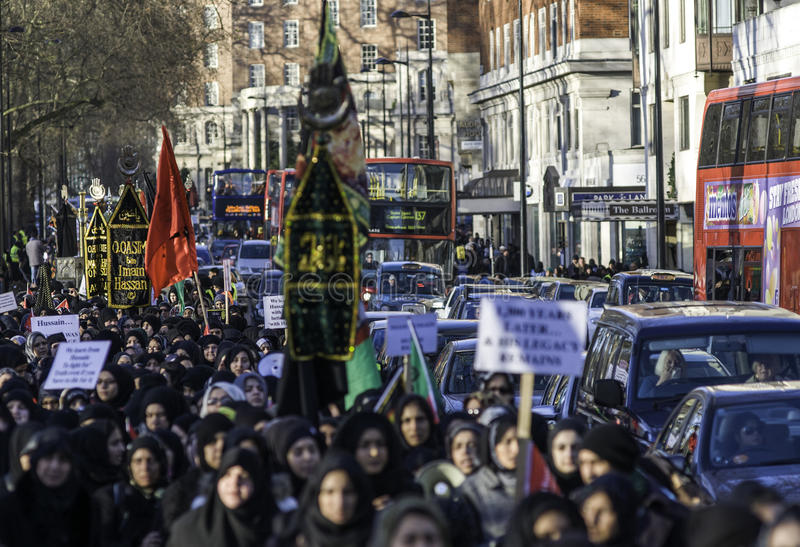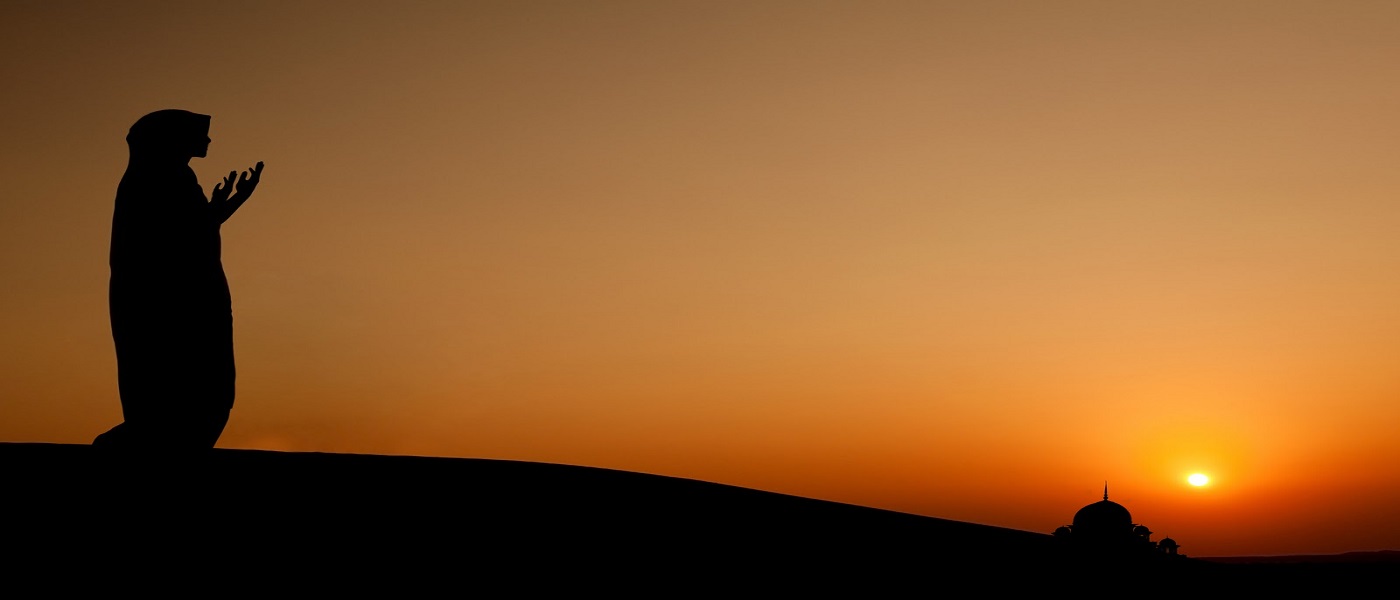

Why Arbaeen walk?
Making pilgrimage to Karbala, where Imam Hussain (AS) and his loyal companions were bravely martyred, takes one of the highest places in a Shia’s wish list. All around the year, Karbala hosts the pilgrims who want to visit the holy shrine of Imam Hussain (AS). But the pilgrimage in Arbaeen is different.
“Arbaeen” takes place forty days later than “Ashura”. “Arbaeen pilgrimage” is actually one of the largest annual public gathering in the whole world. Millions of Shias and Sunnis or even many Christians, Yazidis and other faiths with various nationalities participate in this grand religious ceremony and gather from all around the world in the city of Karbala. A remarkable number of them takes this trip on foot and walks from Najaf to Karbala (approximately 80 kilometers).
Many Muslims try so hard to make it to Karbala on Arbaeen and many Iraqis do their best to serve the pilgrims. During these days, copious amount of food, water, as well as small medical facilities which is run by GPs and specialists, and tents for resting are available along the route and in the cities where the pilgrims stay and visit. These services are all provided free by the native people.
Considering this large number of pilgrims and the great amount of money and time that is spent for this pilgrimage, this question may pop into many minds: What is it for?
Many goals and reasons can be mentioned for why we _Shias_ take this trip and go to the Karbala. In this text, we mention one of these reasons which is of great importance.
Among the many goals of the “Arbaeen walk” ceremony, introducing Imam Hussain (AS) to the whole world seems to be the most significant one. The public gathering of Arbaeen gives us a precious opportunity to make people get to know Imam Hussain’s personality (AS) and understand his message. This unprecedented and unique event that happens only once a year can be so attractive for people around the world who yearn for finding the truth.
Arbaeen walk is an Exhibition
Arbaeen ceremony is a unique event in which people and society go through a huge change, which isn’t seen in any other part of the world. Millions of people gathering in three or four Iraqi cities in about twelve days just for visiting the holy shrines can be a disaster to any other similar countries, but Iraqi people host this ceremony without any difficulties. In these days unlike other times, money loses its meaning. For maintaining peace and discipline, people themselves are enough and there’s not much need for police forces. People won’t be hungry, homeless or harmed by any person. In these days, people are even braver compared to other days, because they dare to face many problems and dangers that are otherwise intolerable. Even when the ISIS was in Iraq threatening the pilgrims, millions of people participated in this ceremony (1).
In this regard Imam Sadiq (AS) says:
O God! Our enemies frowned on their journey and threatened them, but it didn’t stop our followers from getting up and departing towards us in spite of the enemy’s opinion (2).
When people around the world observe this great exhibition, they understand the truth about Islam and Shi’ism which the terrorists like ISIS tried to taint.
Furthermore, Arbaeen walk offers the whole humanity a glimpse at Islam’s suggested life style and civilized society: A society with no war, no poverty, hunger, and no discrimination.

The sound of Imam Mahdi (AS)
As said before, introducing Imam Hussain (AS) is the most significant objective of this grand ceremony. The importance of this purpose lies in the fact that introducing Imam Hussain (AS) and his message is actually introducing our only awaited Imam, Imam Mahdi (As) to the whole humanity. By telling people who is Imam Hussain (AS), we are actually making people familiar with the Shia Imams and the massage of this faith. Shias believe their Imams are all like each other and they seek one goal, which is spreading the peaceful message of Islam to the whole world. This is actually the essential message of Islam, too. The Holy Quran says:
It is He who has sent His Messenger with guidance and the true religion, that He may make it prevail over all religions, and Allah suffices as witness (48:28)
Certainly We sent Our messengers with manifest proofs, and We sent down with them the Book and the Balance, so that mankind may maintain justice (57:25)
Imam Mahdi (AS) is the last Imam who is destined to carry out this mission and we, as his followers, are obliged to raise awareness about His mission and himself. When people understand the message of Imam Hussain (AS) they actually understand Imam Mahdi’s message (AS) since there is no difference between them. The Holy Prophet (PBUH & HP) says:
Allah almighty created me and my Household [the twelve Imams] from one same light (3)Imam Sadiq (AS) also says:
There is always a justful successor among us who defend the religion against the falsification of the extremists, plagiarism of the disbelievers and the wrong understanding of the fools. (4)
According to the prophecies about the last Imam (AS) when he arrives and introduces himself to the people, all the world hears his voice in their language at the same time. Then, Imam Mahdi (AS) introduces himself as the descendant of Imam Hussain (AS):
O people of the world! Indeed my grand ancestor Hussain (AS) was killed while he was thirsty, O people of the world! Indeed he was left on the earth with no cloth, O people of the world! Indeed he was beaten so hard out of animosity (5)
Clearly, when people hear this voice, must know who is Hussain (AS); so, it’s our duty to make them familiar with him.
Resources
- this ceremony
- Thavab al-A’mal, Sheikh Saduq, Pg.94
- Avalim al-Olum, al-Bahrani, Vol.15, Pg.155
- Kafi, Koleini, Vol.1, Pg.32
- Ilzam an-Nasib, Al-Yazdi al-Haeri, Vol.2, Pg.233
Share This Article

The Day of Arafah, the Day of Invocation
One of the features of a believing Muslim is that he/she always wants to grow closer to Allah and constantly seeks His satisfaction. For this reason, there are numerous narrations from the infallible Imams (A.S) indicating the right time and place for seeking closeness to Allah.It is clear that God is the Most Gracious, and his Mercy is always bestowed upon humankind wherever they are. However, there are special times and places at which God’s benevolence towards His creatures becomes even greater. One of these occasions is the Day of Arafah.
When is the Day of Arafah?
The ninth day of Dhu al-Hijjah (the final month of the Islamic lunar calendar) is the day of Arafah when Hajj pilgrims stand on the plain of Arafat (a vast desert about 20 km southeast of Mecca) to pray. Arafah can be translated as knowing, understanding or theosophy [1].
According to historians, it was on the plain of Arafat where Adam and Eve met each other once again after their descent from heaven and long separation upon the Earth, and their sins were forgiven by Allah.
It also recalls how Gabriel taught the prophet Abraham (AS) all the Hajj rituals on the plain of Arafat.
The day of Arafah is so important that Imam Hussain (AS), the third infallible Shia Imam, recited the famous supplication of Arafah one year during his pilgrimage to Mecca on this day.
The virtues of the Day of Arafah
Arafah is one of the most blessed days in Islam that carries a lot of merits for the ones who are present on the plain of Arafat and other people elsewhere. This day in its blessedness and sacredness weighs the same as the Night of Qadr. It has been narrated, “People who were not able to achieve their purpose in the Night of Qadr or those who were not forgiven on that day, Arafah is the last opportunity for them” [2].
So, many Muslims occupy themselves with reciting the Holy Quran, prayer, and supplications hoping that there would be more opportunities for them to be forgiven by Allah on this special day. One of the best deeds performed by Shia Muslims is reciting Imam Hussain’s (AS) supplication of Arafah, which best represents the spirit of this day. Contemplation on this amazing supplication which encompasses facts about monotheism and its degrees will ultimately bring us closer to Allah.
The supplication of Arafah by Imam Hussain (AS)
In this supplication, we first praise God in a loving and friendly manner. Then we count the blessings God has bestowed upon us, and after confessing our misdeeds and sins, we ask Allah to forgive them. That is when we put forth our request to God. Now let’s recite and think about some of the most beautiful verses from this supplication (Dua): (You may also find the audio and the English subtitle of this supplication here.)
Arafah, a better opportunity to praise Allah
“Praise be to Allah Whose determination cannot be repelled by anything, whose gifts cannot be stopped by anything, and Whose making cannot be resembled by the making of anyone. He is the All-magnanimous, the All-liberal.”
A Path to Self-knowledge
“Even before that (before you showed me the right path), You had compassion on me, through Your excellent conferral and Your affluent bestowals. So, You fashioned my creation from semen that gushed forth and put me up in triple darkness among flesh, blood, and skin. You have not made me witness my creation, and You have not referred any part of my creation to me.”
Getting trained at the Divine school of God
“So, Exalted be You, O All-merciful, O All-beneficent. When I commenced (my life) by pronouncing words, You perfected for me the affluent bestowals and brought me up to an increase every year. When my creation was accomplished, and my power became straight, You put me under the obligation of Your Claim, which is that You inspired me with recognition of You and alarmed me by the wonders of Your wisdom.”
Counting God’s blessings
“As You created me from the best of soil, You, my God, have not wanted for me to have a certain favor (and to be deprived of another) and You, therefore, provided me with the various kinds of living and types of wealth, out of Your great and grand conferral upon me, and Your eternal kindness to me.”
Testimony to the boundless Divine blessings
“And I bear witness, O my God, with my true belief, and the fortitude of the determinations of my conviction and the purity of my open belief in Your Oneness and the essence of the secret of my conscience, and the ties of the canals of the light of my sight, and the lines of my forehead and the hallows of the courses of my breath, and the (nasal) cavities of my nose, and the courses of the meatus of my hearing, and whatever my two lips hide and cover up, …”
Human inability to thank Allah
“I bear witness) that if I try my best and strive throughout all ages and at all times, if I live them, to thank properly only one of Your favors, I will not be able to do that, except through a favor of You, which also requires me to thank You for it, once again with new thanking and with praise that is newly acquired and newly prepared.”
The opportunity to repent and ask for forgiveness
“It is I who did wrong. It is I who had evil intention…I now acknowledge of my sins; so, (please) forgive them to me.”
Arafah is one of the best days to turn to God with sincere repentance. Allah, on this day, accepts the repentance of His servants and grant them forgiveness if they are truly regretful and determined to give up their sins.
The demands of a nobleman
“O Allah, (please) make me fear You as if I can see You. Make me happy by fearing You. Do not make me unhappy by disobeying You. Choose for me through Your decree. so that I will not long for hastening that which You have delayed or delaying that which You would hasten.”
Eventually, you will find yourself immersed in the ocean of Allah’s mercy, which is what a true believer always seeks.
“O Allah, Verily, You are the nearest of those who are prayed, You are the promptest of those who may respond, the most generous of those who may pardon, and the most responding of those who are asked. O All-beneficent of the world and the Hereafter, and All-merciful!”
References:
Read More

Are Apostates in Islam Sentenced to Death?
We already wrote an article on the concept of freedom of thought and freedom of expression in Islam. We argued that Islam encourages people to think about their actions and choices. And even when it comes to accepting Islam, Allah wants people to think and choose their path in life with reason and knowledge.
But the question that sounds a little contrary to freedom of thought is that if people are free to think, and then make their choices based on their knowledge and understanding, then why if a Muslim chooses to leave Islam, in some specific cases he is sentenced to death? Is it even true that leaving Islam is always followed by execution?
In this article, we will examine possible conflicts between freedom of thought and expression, and apostasy. We will also clarify if everyone who leaves Islam should be afraid of Muslims who want to kill him?!
Freedom in Choosing Religion in the Quran
There are so many verses in the holy Quran that show Allah does not want people to be forced to accept Islam. The most famous verse is when Allah clarifies that “There is no compulsion in religion; truly the right way has become distinct from error” (2:256).
He explains that the truth has been explained by the Lord and whoever is willing can believe, and whoever is not willing is free to disbelieve. Nevertheless, He also mentions the consequences of being a disbeliever in the hereafter (18: 29). He emphasizes that it wasn’t a hard job for Him to make all the creation believe in Him, but He didn’t, and He tells His prophet: “will you then force men till they become believers?” (10: 99), while God has created human with free will and the capability to choose.
Brief on Freedom of Thought, Belief, and Expression
Freedom of thought is encouraged in Islam as long as it does not lead people and society toward divorcement. “The objective of speech and expression according to Islam is to build up love, tolerance, social harmony, and understanding among members to ensure a peaceful coexistence.” [1] Therefore, freedom of thought is permitted in Islam as long as it does not harm the society.
There is a fundamental rule in Islam, to which other rulings must not be contrary. A Muslim should neither be harmed nor should he harm anyone else. When thoughts are harmful to people in the society, Islam limits freedom in expressing the thoughts that may create social disorder, since one point that is important in Islam, is to provide people with efficient rulings and ideologies to prevent them from bewilderment.
Who Are Apostates in Islam?
If one believes in any other religion or ideology rather than Islam and lives with his belief, no one can force him to convert to Islam. Nor can anyone condemn him for not being a Muslim, because accepting Islam is a personal and rational issue and people cannot be followers of others in this regard.
But if a person who was born a Muslim or was converted to Islam freely and after personal investigations, leaves Islam, he is among apostates in Islam. However, not everyone who leaves Islam is sentenced to execution. An apostate who is sentenced to execution is the one who “renounces a religious or political belief or principle, not a person who is doubtful about principles of religion.” [2]
There are some main beliefs that denying them will make a person an apostate based on Islamic jurisprudence:
1. Denying God,
2. Denying monotheism,
3. Denying prophet-hood of the prophet,
4. Denying the prophet himself,
5. Denying the necessities of religion after knowing their necessity, such as prayer, fasting, almsgiving, etc.
6. Enmity with or humiliating the religion and its sacred places or books or beliefs.
Are All Apostates in Islam Sentenced to Execution?
Allah (SWT) says in the Quran; “He who disbelieves in Allah after his having believed, not he who is compelled while his heart is at rest on account of faith, but he who opens (his) breast to disbelief-- on these is the wrath of Allah, and they shall have a grievous chastisement.” (16: 106)
In the above verse and other verses that talk about apostasy, there is no ruling about an execution sentence for the apostate. But in all the verses Allah warns them of a huge punishment in this world and the hereafter. [3]
Therefore, according to Most Muslim Jurists, if Muslims leave Islam because of their misconceptions about Islamic principles, they are not to face a death penalty, but even they have to be supported by other Muslims and Muslim scholars to continue their investigations until they find the right path in their life. [4]
But if an apostate leaves Islam, while he knows that Islam is the real truth, and expresses his ideas against Islam overtly and extensively, in a way that he misguides other people from this faith, then under some conditions he is sentenced to execution.
According to Mutahhari, the death penalty for an apostate is applicable only in the realm of the Islamic government for the interest of the Islamic society. [5]
Also based on the ruling of Ayatullah Khomeini with regards to Salman Rushdie’s book against Islam and the Prophet of Islam, if someone who lives outside the realm of the Islamic government, commits acts by which he would insult the sacred beliefs of Muslims, or threaten the interests of Islamic government, He is ruled to be sentenced to execution.
Conclusion
As the rulings on the execution sentence for apostates in Islam is based on different aspects that can be realized by the jurists and may vary from time to time, based on the conditions of the time, there is no exact definition for the apostate who is sentenced to death. And if the death penalty applies to an apostate, it will be notified by the Muslim jurists.
References:
- Bhat AM (2014) Freedom Of Expression From Islamic Perspective. Journal of Media and Communication Studies 6: 69-77.
- apostasy in Islam
- the Quran: [2: 217] & [5: 54]
- Hilli, Hassan bin Yusuf, Tahrir Al-Ahkam, vol.2, p. 336
- Makarem Shirazi, N. Maktab e Esalam, year 24, No. 6
Read More

